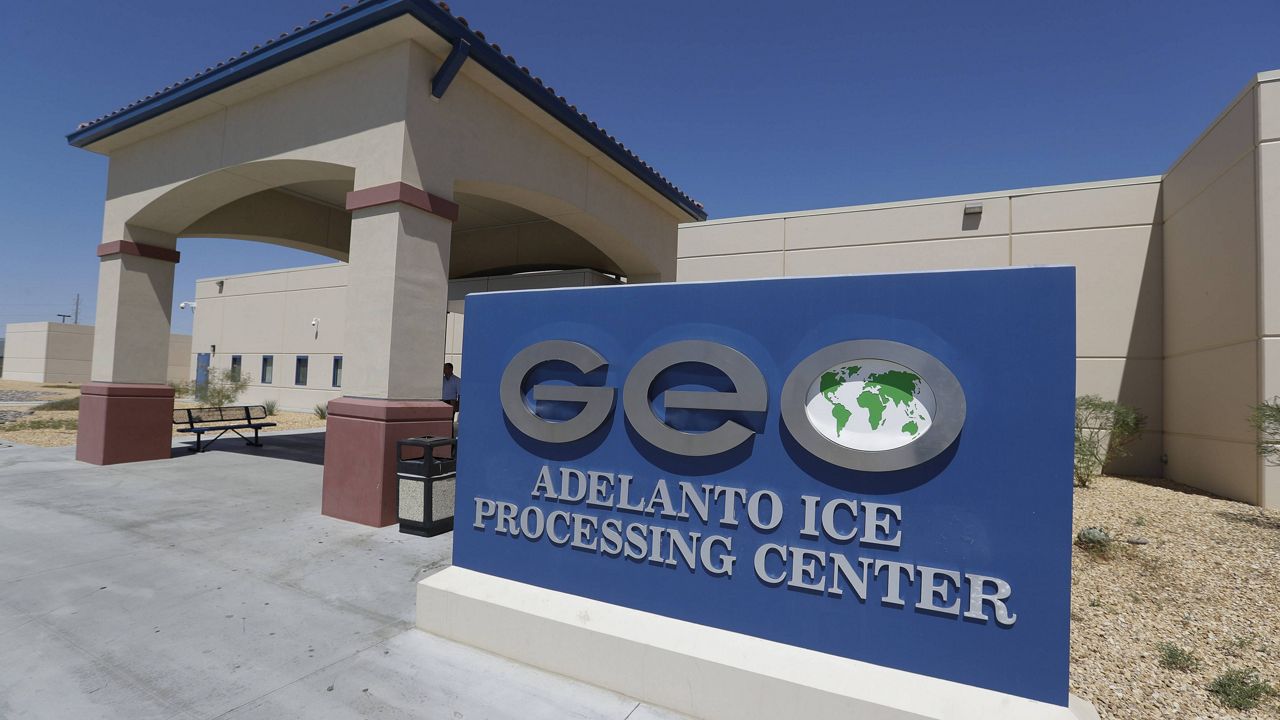EL SEGUNDO, Calif. — When Department of Homeland Security officials made a surprise visit to the Adelanto immigration processing center in 2018, they left with several concerns.
Officials found bed sheets fastened into nooses in most of the men’s cells.
“I’ve seen a few attempted suicides using the braided sheets by the vents and then the guards laugh at them and call them ‘suicide failures’ once they are back from medical,” according to one detainee quoted in the inspector general report of the facility, which is operated by private company GEO Group for Immigration and Customs Enforcement.
The report listed other concerns, including limited medical checks on detainees and waits for dental care that sometimes stretched years. In response, ICE committed to a full inspection and meeting health and safety standards.
While serving in the state assembly, Rob Bonta, who just reached 100 days in office as California’s attorney general, introduced Assembly Bill 32 to ban private, for-profit prisons and immigration detention centers. But a lawsuit over the 2019 law currently awaiting a decision from the 9th U.S. Circuit Court of Appeals comes at an increasingly difficult time for President Joe Biden's administration that appears concerned this type of ban could limit the federal government’s ability to detain people facing deportation across the country.
“There’s less commitment to health and safety,” said Bonta in an interview with Spectrum News about these facilities.
The bill restricts the California Department of Corrections and Rehabilitation from renewing or signing new contracts and prohibits any such facility in the state by 2028.
GEO Group sued, followed by the Department of Justice under Attorney General William Barr, an appointee of former President Trump.
Two weeks before the law went into effect, ICE signed 15-year contracts with GEO Group for two detention centers in an apparent attempt to circumvent the new law, advocates say.
“It’s not an appropriate part of how we should have our criminal justice system,” said Bonta, who is now leading the legal defense of the bill he authored. “The financial incentives are all wrong.”
Current Attorney General Merrick Garland has continued the legal challenge against the law, despite calls by Congressional representatives to drop the appeal.
“Continuing this appeal puts the Department of Justice in the way of President Biden’s stated goal to ensure that the federal government does not use private facilities for incarceration,” said a letter co-authored by Rep. Norma Torres, D-Pomona, and signed by 24 other representatives.
Justice Department lawyers have argued other states could limit essential federal government functions if courts upheld AB 32.
“If we picture states throughout the country deciding for various public policy reasons that they’re going to, maybe not as extreme as this, but make it difficult or in this case impossible for the federal government to contract to perform its operations, the full extent of that would be extraordinary,” said Justice Department attorney Mark Stern in a June hearing before the 9th Circuit.
Hamid Yazdan Panah, advocacy director for Immigrant Defense Advocates, disagreed, saying ICE can detain people without contracting out to private companies.
“There’s nothing in AB 32 which prevents ICE or the federal government from detaining anyone for an immigration matter,” he said. “But what it actually gets to is the fact that ICE wants to detain thousands of people, but it wants to outsource the dirty work to private, for-profit companies.”
For Yazdan Panah, the possibility of other states passing similar legislation is actually one of the reasons his group has advocated for the law and filed court briefs in favor of it.
“And if that does happen, then I think you can see significant financial impact not only to these private companies, but then also to the way that ICE represents that it has to do business this way,” Yazdan Panah said.
In April, GEO Group sued Washington State over a law passed there mandating the closure of an immigration detention center the company runs.
He said population reductions at immigration centers during the COVID-19 pandemic show there are alternatives to detention.
In Adelanto, a federal judge ordered ICE to reduce the number of people at the 1,940-bed center to 475 detainees because of “tinderbox” conditions for the disease to spread there.
One detainee died three days after he was released from the facility, where he contracted COVID-19. He had previously petitioned for release due to underlying health conditions that put him at risk.
“These are people in civil detention who don’t have to be detained, Yazdan Panah said. “There could actually be very clear community alternatives.”
GEO Group estimates it could lose $4 billion in future revenue and capital investment if AB 32 is upheld.
The GEO Group didn’t respond to multiple interviews requests for this story.
Immigration has become a key challenge for the Biden administration as U.S. Customs and Border Protection encounters record numbers of individuals at the southern border.
Despite the pressure of balancing migration amid an ever-changing COVID-19 pandemic, Yazdan Panah said President Biden has failed to live up to campaign promises.
As a candidate, Biden said undocumented immigrants shouldn’t be detained in private facilities.
“I think the issue of AB 32 in California represented the easiest way in which they could partner with the state to imagine what ending immigration detention could look like,” Yazdan Panah said. “And it’s really disappointing that they chose not to pursue that path.”



